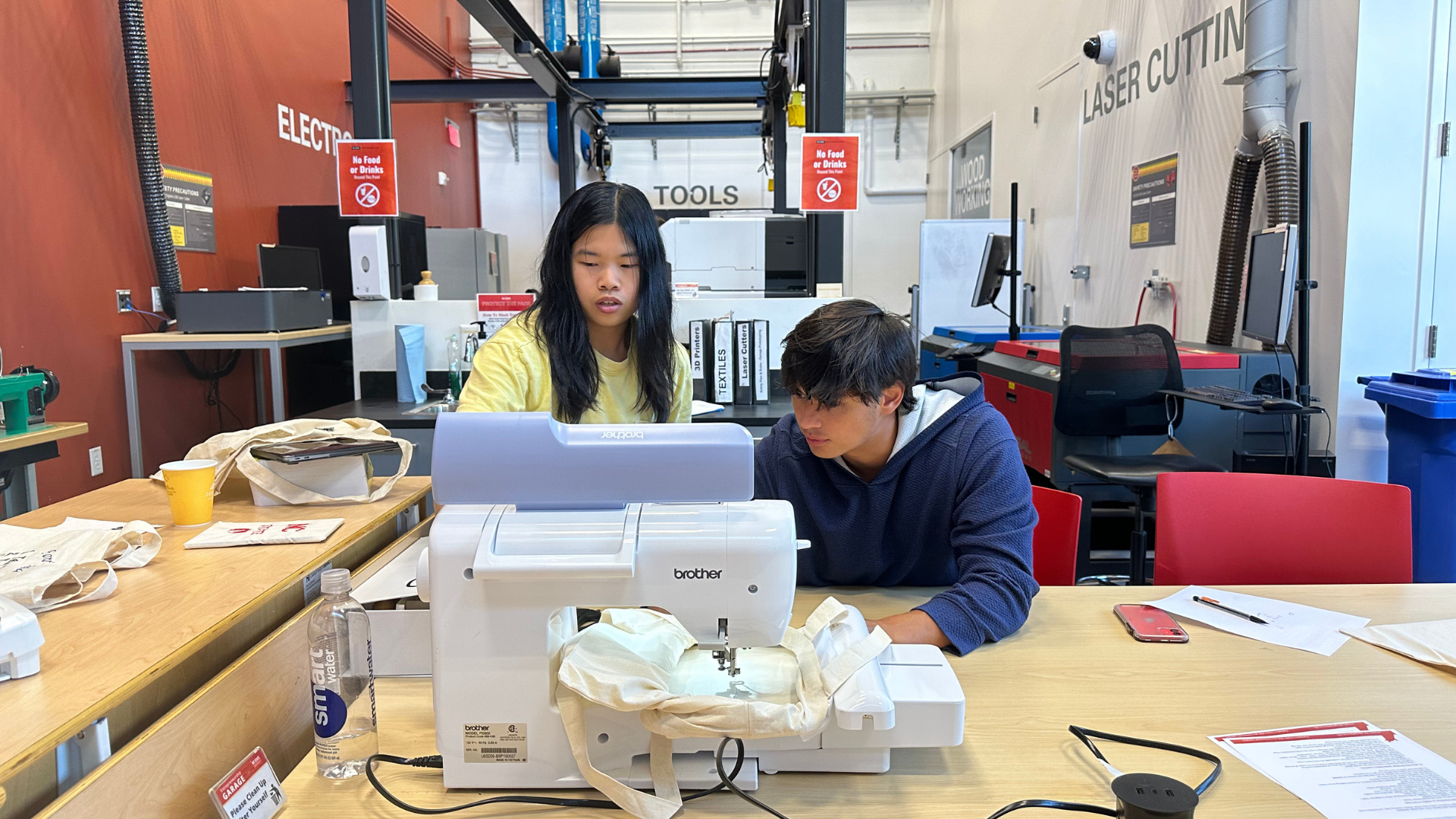Creating Value for Wolfpack Investors—and Students

The opportunities offered by the Jenkins MBA program’s TEC Scholars program traveled up the East Coast and drew Gary Sanguinetti from New Jersey to North Carolina. An auditor with Deloitte for several years, Sanguinetti had run his own business for a while and wanted to re-enter the entrepreneurship sector. The Technology Entrepreneurship Commercialization (TEC) program at NC State’s Poole College of Management had recently launched a collaboration with the Wolfpack Investor Network (WIN) and offered a scholarship opportunity for full-time MBA candidates with interests in entrepreneurship and commercialization.
The prospect of working directly with investors and startups proved too compelling for the aspiring entrepreneur to ignore. Now in his second year of the program, Sanguinetti is glad he moved south.
Diving into the Investment Process
TEC scholars distinguish themselves from other students in the TEC curriculum by acting as project leads on due diligence teams for WIN. These teams, composed of graduate students from all over the university and supervised by Poole College faculty and WIN management, research companies run by NC State alumni and compile their findings into a due diligence report that WIN investors rely on when making decisions about which companies to fund.
The collaboration with WIN amounts to NC State alumni investors supporting Wolfpack alumni entrepreneurs.
Lisa Chang directs the TEC program, now in its sixth year of scholarship awards, and manages the due diligence teams. “Creating due diligence reports is a capstone opportunity for all graduate students, and an excellent leadership opportunity for TEC scholars,” she said.
The WIN leadership team — including co-Managing Directors, Joe Sinsheimer and Brett Danforth, and Assistant Director for Member Services, Abby Phillips — reviews companies’ requests for funding. The WIN leadership team generally considers only companies that have revenue and employees. Once the team agrees on a company to bring before WIN investors, they alert Chang, who assigns TEC Scholars to lead the due diligence process and other graduate students with subject matter expertise to research the companies and write the due diligence reports.
Sanguinetti said that, with the amount of responsibility TEC scholars have in producing the reports, “you can be a leader from day one.” Sinsheimer and Phillips advise students on how to talk with companies and investors, “then they let us loose,” he said. “They’re always there for support. They read our reports and make edits. But they let us figure out how to lead a team and what our management style is working with real companies.”
Depending on the deal flow, TEC Scholars may work together on a due diligence report, or they might each form a separate team. A TEC Scholar leads the team, working with Chang to recruit other students in the TEC curriculum, Jenkins MBA program, or graduate students in other departments at NC State. While many Jenkins students also have technical backgrounds, often the technology behind the product or service is beyond the ken of MBA students, and tapping the expertise of a doctoral student in one of the sciences fills in any knowledge gaps.
Sanguinetti appreciates the cross-disciplinary approach. “It gives me exposure to other sides of the business as well, not just the financials. The reports deal with industry trends and business models, so I get exposure to those areas as well.”
Andrew Bowker, who has worked on several due diligence reports during his year and a half as a TEC Scholar, said the graduate students in the other disciplines help break down the PhD-level terminology into language the general consumer can understand.
“I keep asking them questions until I can communicate the technology description to a 4-year-old,” he said. “We need to help investors understand what is going on behind the scenes and how the technology works.”
The comprehensive nature of the reports challenges students, who all bring different areas of expertise and want to emerge with a more complete understanding of bringing a product to market and raising funding for it. Grace Williamson, who is finishing up her first semester as a TEC scholar, has a background in public relations, including for a startup and a nonprofit that aids entrepreneurs. She wants to refine her career marketing for startups. She was drawn to the TEC Scholarship opportunity to learn the full scope of business principles.
“A huge piece of the due diligence reports is to see where the money is coming from and where it is going,” she said. “We look at market size and the potential for their product or services. We’ll talk about their business model, how they make money and who their target customers are. We’ll address any strengths, weaknesses and threats.”
The process “can put you outside your comfort zone,” Sanguinetti added, “but the program gives you the tools to succeed.”
Phillips puts the TEC scholars in contact with the company’s CEO and provides a template for how to frame the report, which lays out the opportunities and risks inherent to that particular business.
The due diligence team begins by interviewing the CEO and other C-level executives in the company.
“We grill them,” Bowker said. “We dive into every facet of the company from the financials, to the marketing strategy, to the team, to the business model, to the underlying technology. We look up market reports and cover external factors, such as market conditions or current events that have happened that might impact the success of this product or service.”
The questions have to be tough, Bowker said, because the investors will ask similar questions at the pitch presentation, and the company execs will need to know the answers.
The TEC scholars and due diligence team attends the pitch to WIN investors, something that Williamson enjoys.
“It’s fun to watch the pitch presentations and learn how companies position themselves and how they respond to questions,” she said. Afterward, diligence team compiles questions that WIN investors asked and try to get answers.
Discovering Insights and Passions
As one of the first female TEC scholars, Williamson had an epiphany at one of the first pitches she attended: Only a handful of women were among the WIN members making investment decisions. “I want to be one of those women someday,” she decided
“It’s a passion of mine to get other women involved in this entrepreneurial industry, to bring their voices to the table,” she said. “I hope my involvement will inspire other women.”
Being able to talk with entrepreneurs, company executives and investors has been invaluable, Sanguinetti said. “The program has put me in front of a lot of intelligent people. The visibility is tremendous, and there is so much that I can learn.”
Bowker agrees. “TEC scholars has been far and away the best experience of the MBA program,” he said. “I’ve learned more about business and strategies from WIN than in any class or project, because it’s real. As an aspiring entrepreneur, I’m now connected to CEOs who have been there and done that. I’m connected to investors. I have this community of people around me I can lean on and talk to in order to solve tough problems.”
Once WIN is ready to make a call for commitment, Chang said, the due diligence report is sent out to all WIN members, along with the video of the pitch presentation, so those not able to attend can be informed.
The reports make no recommendation on whether to invest, Chang said. Students work on each report for four to five weeks, sometimes for up to 20 hours a week. “An individual investor doesn’t have the time to do that, nor have that level of access to the company,” she said.
WIN’s 150 investors make investment decisions individually, not as a group. In the two years since the network formed, WIN investors have invested in 18 deals in 15 portfolio companies. (Two companies received second and third-round funding.) In total, WIN has made over $9 million in investments. Some companies have received more than $1 million.
Some of the companies WIN has funded have resulted from a class students take during their first year of the TEC curriculum. MBA students are assigned to multi-disciplinary teams with other graduate students they may not know. Each team creates its own technology portfolio from a pool of intellectual property from various university or government tech transfer offices, and determines whether each can be logically brought to market as a product or service. Students talk with people in the industry about the market problem/solution fit, and look into how much it would cost to produce and how much money they would need to succeed. They are mentored by executives-in-residence who volunteer as coaches. At semester’s end, they pitch their idea and decide whether to build it into a startup business during the following semester.
Several recent notable startup and alumni successes have come from the TEC program or have been influenced by its faculty and students. Tethis has created biodegradable diapers made from plant cellulose. Reveal Mobile provides digital advertising across mobile apps and social media. And Mimikai, expected to debut in the U.S. in 2019, offers an effective DEET-free, natural mosquito repellent.
The TEC curriculum started out with only one cohort a year; recently it added a second, to have a cohort begin in the fall and in the spring. “You don’t have to be an entrepreneur,” Chang said. “We’re trying to create a new generation of critical thinkers and problem solvers. Being able to think outside the box is healthy for any startup and for economic development.”
The startup ecosystem is booming, Bowker said. Large corporations are hiring “intrapreneurs,” entrepreneurs who can bring new life and agility to organizations that want to be more nimble to compete. The connections he has gained as a TEC scholar will give his career a boost, too.
“You never know what networking relationship will benefit you,” he said, “and who you will benefit down the line, too.”
About the Wolfpack Investor Network
The Wolfpack Investor Network (WIN) showcases the university’s best and brightest by curating university-related investment opportunities for its investor members. WIN provides members with a professionally managed investment platform as well as an opportunity to collaborate and network with other like-minded alumni, parents, and friends of the university who are interested in early stage investing. Since its inception two years ago, WIN has collectively invested $9.05 million into 15 portfolio companies spanning industries such as food science, medical devices, advanced materials, and therapeutics. To find out more about the Wolfpack Investor Network, please visit https://research.ncsu.edu/win/.
This post was originally published in Jenkins MBA News.


